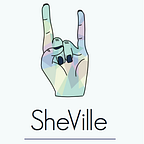“We are changing attitudes. We are changing systems. These pieces all make a difference.”
The Shelter for Help in Emergency is a Charlottesville-based nonprofit best known for its 24-hotline and temporary housing for victims of domestic abuse.
But that’s not all SHE is.
Cartie, the Executive Director of the grassroots organization, says even using the phrase “domestic abuse” is limiting — women don’t have to be married or live with their significant other to experience violence in their relationship. Instead, Cartie says SHE uses the phrase intimate partner violence because the term domestic abuse is isolating and doesn’t encompass the many types of gendered violence women might face.
Thinking about the language we use to describe intimate partner violence is one of the simplest — but most important steps — that’s a part of SHE’s broader goal to create an inclusive and unconditionally safe community for women in Charlottesville and beyond.
Beyond providing emergency housing to women in danger, SHE also has a 24-hour hotline, free individual and group counseling, legal advocacy services to women seeking to press charges against abusers, case management services and educational programs for outreach into the community.
One particular area of concern, Cartie says, is the disconnect between U.Va. and the broader community.
A lot of times, students who find themselves in potentially dangerous relationships might not look beyond university resources to help them respond and recover.
“There is a sense on grounds that the community is something distant — students often think the only resources they have are sponsored by U.Va. Our organization needs to help students understand that we are here for them as well, not just married women experiencing violence.”
Part of addressing that gap is targeted outreach, sometimes something as simple as leaving pens around the community.
One particular staff member at the Shelter made it a personal goal to leave the shelter’s purple pens at as many businesses around the city as possible — the bank, the post office, and any restaurants she frequents — in hopes that the hotline number just might fall into the hands of someone who needs it.
SHE also takes a systematic approach to ameliorating the prevalence of intimate partner violence in our community.
With their PEACE project, which stands for Police Education and Awareness in Communities Everywhere, the shelter visits law enforcement departments in Charlottesville and the 5 surrounding counties, and talks to officers about protocol for responses to intimate partner violence. It’s also an opportunity to further provide information about the 24-hour hotline and to answer any questions the officers might have.
But systemic organizations like law enforcement haven’t always expressed concern for the danger of domestic violence. A decade ago, officers responding to house calls wouldn’t think twice about what it meant to leave a victim with his or her abuser.
“When I first started, a lot of the law enforcement response was going to the house on a call and telling the guy to cool off with a walk around the block, instead of looking at it with a deeper lens to see that there’s an issue of power and control — a cyclical pattern that gets worse over time,” Cartie recalls.
On top of which, officers would frequently say things like “Don’t call me again, I don’t want to come back” to the women, minimizing the urgency of the scene and further gaslighting them into thinking the violence was no one’s fault but their own, Cartie says.
But that perspective is a thing of the past, in part thanks to organizations like SHE.
Now, officers investigate domestic violence calls more thoroughly, going through a questionnaire with victims and calling SHE’s 24-hour hotline while at the scene.
“Law enforcement has changed — law enforcement’s approach to domestic violence has changed. Officers are saying ‘why haven’t we been doing this?’ Cartie explains. “We are changing attitudes. We are changing systems. These pieces all make a difference — whether it’s a pen, a volunteer hotline, or system of law enforcement.”
Beyond these year long initiatives and programs, this month is an especially important one for SHE to make an impact in the community. October is Domestic Violence Awareness month.
They begin the month with a candlelight vigil honoring community victims of intimate partner violence. Events like their 5k run and their brown bag lunch series, in which community members gather to listen to survivors’ stories and share a meal, tend to garner the most attention.
Hearing survivors tell their stories inspires community members to be more active about the issue of intimate partner violence, whether that be through volunteering at the shelter or just by being a listening ear.
With over 100 volunteers, SHE is able to flourish with the help of passionate community members — and more are always welcome.
“An individual does make a difference in this world,” Cartie says. “While we care about creating systemic change in our culture and our society, a lot of times that starts with the individual.”
Want to get involved? Become a volunteer with SHE: http://www.shelterforhelpinemergency.org/volunteer/
Or visit their facebook page:
https://www.facebook.com/ShelterforHelpinEmergency/
If you liked this article, be sure to check out our Facebook page, and read our other Women of Charlottesville articles: https://www.facebook.com/SheVilleCVille/?modal=media_composer
